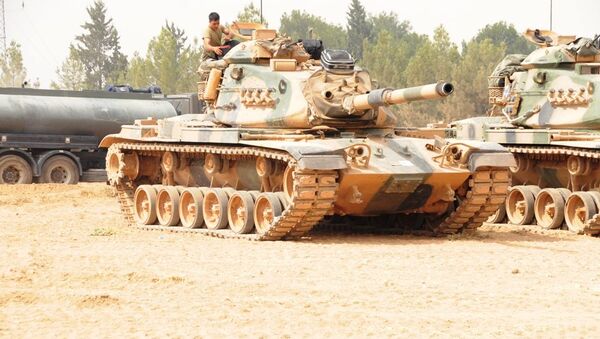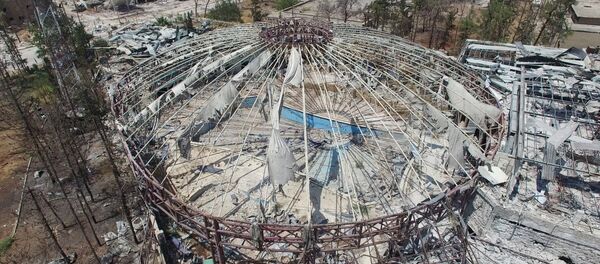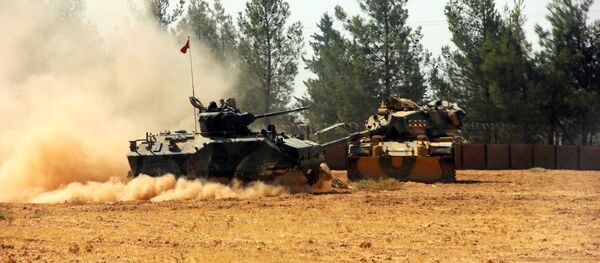On Wednesday, Turkey launched a military operation dubbed "Euphrates Shield" aimed at liberating the border town of Jarablus from Daesh (ISIS/ISIL).
Interestingly enough, the beginning of the operation nearly coincided with Vice President Joe Biden's meeting with Turkish President Recep Tayyip Erdogan and Prime Minister Binali Yildirim in Ankara.
"Turkish tanks, American warplanes and Syrian rebels joined forces Wednesday in a major cross-border assault into northern Syria that quickly pushed Islamic State forces from a strategic border town," the Wall Street Journal reported on August 24.
Although President Obama vowed not to become involved in the Syrian war two years ago, Washington has directed the US military "to participate in an invasion of northern Syria alongside NATO-ally Turkey," the experts note.
"News says that the US joins Turkish forces to launch push against the Islamic State [Daesh] in Syria and there is a change on this. It isn't the usual staff going back and forth, this looks like… an invasion. And if you think 'invasion' is a little bit too strong the term, if it hasn't been yet it looks like it could lead to one," Dr. Paul suggested.
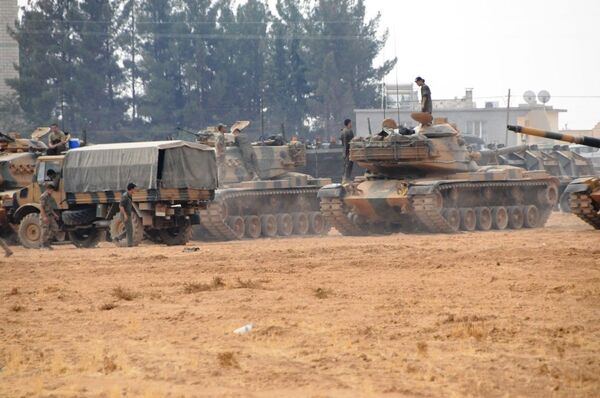
For his part, Daniel McAdams assumed that the recent move has all the earmarks of an invasion.
McAdams noted that Turkish troops moved into northern Syria with US-backing — the US-provided intelligence, and drones, and "maybe even troops." They invaded part of northern Syria essentially to stop the Kurdish advance, signaling that they will not allow the YPG forces to spread further beyond the Euphrates, the expert noted.
"What's going to happen, Dr. Paul, this dotted line [a 100-kilometer-long corridor stretching from Jarablus in the east to the Syrian city of Azaz in the west] is going to be occupied essentially by Turks. And that would be I think the kernel of a no-fly zone that the Turks have wanted for a long time on their border with Syria," McAdams undescored.
"We've informed the Russians where we're at… (they) tell us they've informed the Syrians, and I'd just say that we will defend ourselves if we feel threatened," Lt. Gen. Stephen Townsend told CNN Saturday.
During the August 22 Department of Defense press briefing the Pentagon Press Secretary Peter Cook tried to convince journalists that the "warning" does not mean the establishment of a no-fly zone over the Hasakah region for the Syrian Air Force.
"It's not a no-fly zone, but I would just again reiterate what you heard from Captain Davis last week and which you'll hear from me again, that the Syrian regime would be wise to avoid areas where coalition forces have been operating. And we will continue to defend them and if need be we will send aircraft again to defend our forces," Cook said, refusing, however, to specify whether US warplanes are now flying regular air patrols in the region.
Commenting on the matter, Iran's Fars News Agency nailed the Pentagon for hypocrisy, stressing that any "exclusion" zones or "no-fly" zones will throw a wrench into the Russo-Syrian fight against Islamists in the region.
Dr. Paul underscored the establishment of "no-fly zones" is de facto an attack on the national sovereignty. He recalled that Hillary Clinton has long been a promoter of no-fly zones in Syria. It appears that she has finally got one, the former congressman remarked.
The situation is getting messier and messier for the US in Syria, Dr. Paul believes. He referred to the fact that although the US has long been supporting the Kurdish militants, Washington has now involved in restraining the former allies.
The Wall Street Journal points out that during his visit to Ankara, Joseph Biden "delivered an unusual public denunciation of the Kurdish forces," claiming that if the Kurds do not keep their commitment to return to their strongholds on the eastern side of the Euphrates "they cannot-will not-under any circumstances get American support."
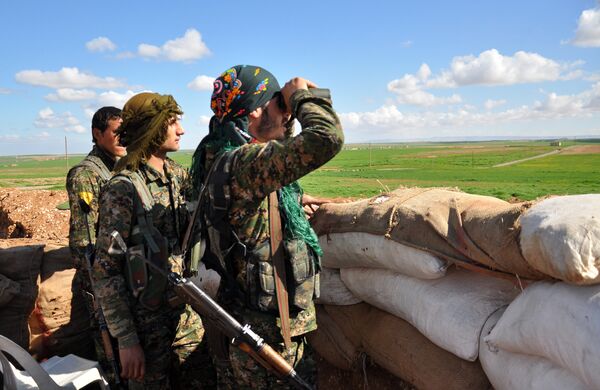
In his interview with Sputnik, Huseyin Bagci, a political analyst at the Middle East Technical University (ODTU) in Ankara, pointed out that "the Jarablus operation was authorized by the United States and Russia."
"This was a coordinated move," Bagci told Sputnik.
At the same time, Russian political commentator Vladimir Ardaev noted in his article for RIA Novosti, that the Turkish forces have liberated Jarablus bolstering Syrian opposition forces in the first place, not those of legitimate Syrian President Bashar al-Assad. In this context it is understandable why the US was backing the operation, he added.
"Moscow is seriously concerned by the developments on the Syrian-Turkish border, and is especially alarmed by the prospect that the situation in the conflict zone will continue to deteriorate, resulting in greater civilian losses and heightened ethnic tensions between Arabs and Kurds," Russia's Foreign Ministry statement says.
It adds that Moscow firmly believes "that the Syrian crisis can be settled exclusively on the solid foundation of international law through an inclusive intra-Syrian dialogue."
